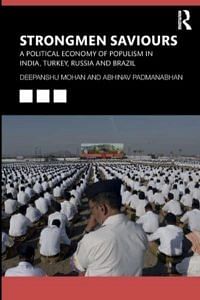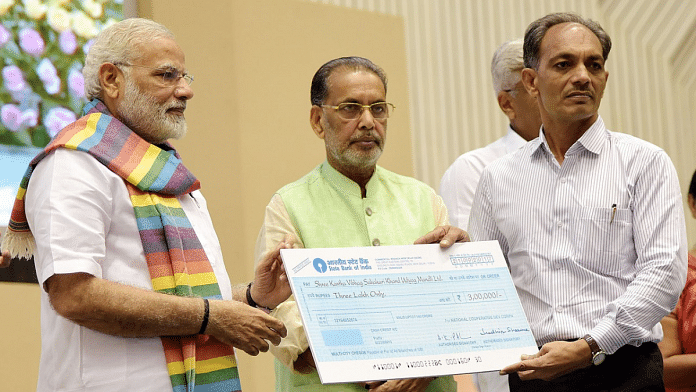In the quiet town of Vadnagar, on 17 September 1950, a tea seller and his wife welcomed their third son to the world. Little did Damodardas Mulchand and his wife Hiraben know that Narendra Damodardas Modi would go on to become Gujarat’s longest-serving chief minister and, eventually, India’s 14th prime minister.
During his childhood, Modi frequently spent his time running errands for his father’s tea stall. When Narendra, along with some of his peers, participated in group sessions organised by the Rashtriya Swayamsevak Sangh (RSS), he was able to take a break from his monotonous everyday routine. What began as a simple after-school hangout with a group of friends evolved into a crucial building block in the development of Narendra’s character and (political) future.
As an RSS volunteer, Narendra took part in the organisation’s grassroots activities, such as distributing flyers; and he attended the organisation’s daily sessions on a regular basis. Soon, this escape from the daily grind at school and at the tea stall evolved into a catalyst for him to explore and grow. The RSS training consisted of two parts: one focused on physical strength and the other on character development. This training would have a long-term impact on Modi throughout his life. It provided him with a higher calling, as well as the strength to pursue it with determination.
According to Modi’s eldest brother, Sombhai Modi: ‘Narendra always wanted to do something different. Something more than what we did as a daily routine at home and at school. And the RSS shakha provided him just that’ (Jose 2012). Joining the RSS shaped his entire life – not just politically, but also personally and spiritually. As a grassroots organisation promoting the right-wing nationalist narrative in India, the RSS would also have a big impact on Modi’s brand of politics in the future.
While the RSS shaped Modi, it also served as a springboard for his foray into active politics. Modi met Lakshmanrao Inamdar, the man who would later become his political mentor, through the RSS. According to political biographer Kingshuk Nag, Modi is considered to be the ‘Manas Putra’, or ideological son, of Inamdar in RSS circles (Nag 2013). While different chroniclers place the young Modi’s first interaction with Inamdar at different periods of his life, according to Modi, this occurred during his time as a student cadet (Marino 2014). Inamdar was an ardent member of the RSS who traversed Gujarat extensively to establish RSS shakhas. He was a lawyer by profession and was affectionately referred to as ‘Vakil Saheb’, or ‘Advocate Sir’.
Also read: Modernisation, Modi, and Madhya Pradesh: The 3 Ms that reformed the BJP
Modi later wrote a biography of Inamdar, titled Jyoti Punj, as a gesture of gratitude to his mentor. Modi expressed admiration for Inamdar’s work in the book, recalling how the latter worked relentlessly to fight court challenges on behalf of his peers following Mohandas Karamchand Gandhi’s killing. Inamdar would not only shape Modi’s political world view, but would also be the person who initiated him into a life of active politics.
While he was being introduced to active grassroots politics, Modi was also refining his oratory and public speaking abilities, which observers note when assessing Modi as a politician. As a child, he was an enthusiastic participant in school plays and debates, which fostered in him the confidence that finally transformed him into the camera-friendly public personality he is today. He honed the art of mobilising an audience through his oratory, compelling them to hang on every word he spoke.
In the Ghanchi caste, to which Narendra belonged, children are often married through a three-step process. The first step involves looking for a match; the second step involves a formal marriage at the age of 13; and the third involves the couple moving in around the age of 16 or 17. As was the practice, Modi was betrothed at the age of six and married to Jashodaben at around 13. After the second step, however, Modi started protesting against the idea of marriage. Hence, after finishing his higher secondary education in 1967 and before he was supposed to move in with his spouse, Modi left home and wandered across various maths (temples or monasteries) and ashrams in Northeast India. It is during this time that he travelled to seek more knowledge at centres of learning that were based on Swami Vivekananda’s teachings. He soon came to the realisation that he was not suited to this life and hence returned home for a brief period in 1970 before moving to Ahmedabad to work in his uncle’s canteen.
However, throughout these changes in his personal life, Modi always kept the RSS and its teachings at the back of his mind. In Ahmedabad, Modi reconnected with fellow RSS members and Inamdar, and devoted himself to the service of his mentor. He also became politically active, especially after the 1971 Indo-Pakistan War. Modi took part in protests against Pakistan’s crackdown on East Pakistan and later in anti-government demonstrations. There are reports of him being arrested as a result of his participation in these protests. His proactive work grabbed the attention of RSS members and he gained prominence within the organisation.
In 1972, Modi left his uncle’s house and became a full-time member or pracharak (promoter) of the RSS, living in the Hedgewar Bhavan, the RSS headquarters in Ahmedabad. He started his growth in the RSS after completing his officer training course for pracharaks in Nagpur. Pracharaks are touted as the lifeblood of the RSS and devote themselves to the service of the organisation. As Bharat Karnad notes: “The RSS’s role as something of a management school honing Modi’s organizational talent is important from the point of view of his rapid advancement in the Sangh, and in the BJP to which he was deputed. Its more personal and intimate value to Modi lies in the Sangh being his family and home, affording him a sense of ‘belonging’ and comradeship. His experiences in and of the Sangh provided him the model, once in power, to order the reality around
him in a similar manner.” (Karnad 2018)
Also read: RSS ‘Seva’ mixing religion and patriotic duty wrong: Jagat Narain
In June 1975, then-Prime Minister Indira Gandhi declared a state of emergency,
which resulted in the prosecution and imprisonment of the government’s opponents and critics. The RSS was one of the groups that was banned during this period. Modi was urged to complete his formal study at this time by his mentor, Inamdar, and was enrolled in Delhi University. According to some reports, this was only a guise under which he could act as a ‘courier’ for the then-banned RSS (Hall 2019), and take messages back and forth between Hindu nationalists and opposition leaders. He earned a bachelor’s degree in political science from the University of Delhi’s School of Open Learning in 1978.
It is debatable whether the motivations behind Modi’s tenure at Delhi University were academic or political; but what is unquestionable is that he became a crucial asset for the RSS during this period. He also became a member of the RSS’s student wing, the Akhil Bharatiya Vidyarthi Parishad (ABVP), or All-India Student Council. His activism later earned him the position of leader of the ABVP’s Gujarat chapter, which he served while studying for a master’s degree in political science at the University of Gujarat (awarded in 1983). Both of Modi’s academic credentials would be contested by his political opponents in the years to come.
 This excerpt from Strongmen Saviours: A Political Economy of Populism in India, Turkey, Russia and Brazil by Deepanshu Mohan and Abhinav Padmanabhan and published by Routledge London and New York has been reproduced with permission. To reach out to the authors for any queries/clarifications, please contact Deepanshu Mohan at dmohan@jgu.edu.in
This excerpt from Strongmen Saviours: A Political Economy of Populism in India, Turkey, Russia and Brazil by Deepanshu Mohan and Abhinav Padmanabhan and published by Routledge London and New York has been reproduced with permission. To reach out to the authors for any queries/clarifications, please contact Deepanshu Mohan at dmohan@jgu.edu.in



